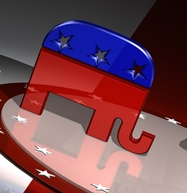I’m sure you’re as baffled as I am as to why GOP Congressmen aren’t exactly chomping at the bit to endorse the likes of Mitt Romney, Herman Cain, Michelle Bachmann or Rick Santorum (sarcasm intended). But here’s an interesting article from The Washington Post about how things are unfolding a little more slowly on that front for 2012:
Across the country, most Republicans haven’t committed fully to any of the party’s presidential candidates. In the latest Washington Post-ABC News poll, 69 percent on the GOP side said there was still a chance they could change their minds about their choice.
In Washington, an elite focus group of 289 Republicans was even more indecisive.
That group consists of the GOP members of the House and Senate, of whom just 60 — or 21 percent — have publicly endorsed a presidential candidate, according to a list maintained by the Capitol Hill newspaper Roll Call.
The lawns of Iowa and New Hampshire are still covered mostly with leaves, not snow, so lawmakers have some time left to choose a side. But the endorsement pace has been much slower than it was during the last election cycle.
Across the country, most Republicans haven’t committed fully to any of the party’s presidential candidates. In the latest Washington Post-ABC News poll, 69 percent on the GOP side said there was still a chance they could change their minds about their choice.
In Washington, an elite focus group of 289 Republicans was even more indecisive.
As of Nov. 9, 2007, 107 Hill Republicans — 43 percent of the total then serving — had offered their endorsements to a White House contender, according to a Roll Call tally at the time.
The current list includes 36 endorsements for former Massachusetts governor Mitt Romney, 14 for Texas Gov. Rick Perry, six for ex-House speaker Newt Gingrich (Ga.), three for Rep. Ron Paul (Tex.) and one for businessman Herman Cain. That total does not include Paul himself, although his preference appears clear. The same is true for Rep. Michele Bachmann (Minn.).
Former Utah governor Jon Huntsman Jr. and ex-senator Rick Santorum (Pa.) have yet to receive any Capitol Hill endorsements.
Four years ago, Romney led the way with a similar number, 33, followed by Sen. John McCain (Ariz.) with 29, ex-New York mayor Rudolph W. Giuliani with 24 and former senator Fred D. Thompson (Tenn.) with 21.
 Greg Valliere of the Potomac Research Group recently ranked the likelihood of 10 Republican hopefuls for the 2016 candidacy for President. Business Insider offers a summary for each candidate, but here’s the list. (And you’ll notice our governor made the list — and some in the media speculate he has a much better shot than that.):
Greg Valliere of the Potomac Research Group recently ranked the likelihood of 10 Republican hopefuls for the 2016 candidacy for President. Business Insider offers a summary for each candidate, but here’s the list. (And you’ll notice our governor made the list — and some in the media speculate he has a much better shot than that.):
 What’s missing in political debates? OK, that might be a dangerous way to phrase it. But a
What’s missing in political debates? OK, that might be a dangerous way to phrase it. But a  After his narrow Iowa victory, Mitt Romney appears to be the most likely choice to garner the GOP presidential nomination. However, due to the fact that many conservatives simply don’t like him, that’s far from a certainty. CNN has an
After his narrow Iowa victory, Mitt Romney appears to be the most likely choice to garner the GOP presidential nomination. However, due to the fact that many conservatives simply don’t like him, that’s far from a certainty. CNN has an